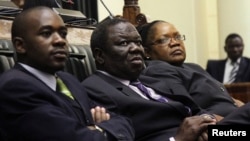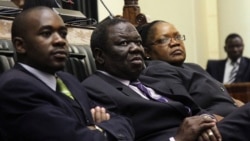After lengthy deliberations, the government of Zimbabwe has set March 16 as the tentative date for a national referendum on a proposed new constitution. The United States welcomes consensus among the political parties there on the draft. A peaceful, credible referendum would herald a major step toward democratic reform in the long-troubled Southern African nation. We stand with our international partners in supporting a peaceful, credible ballot.
The last four years have been a difficult period in Zimbabwe’s history. The 2008 presidential election ended in dispute amid voting irregularities and political violence by elements of the state security forces and factions within President Robert Mugabe’s ZANU-PF Party. At the urging of the Southern African Development Community, or SADC, this led to the creation of a unity government in 2009 with President Mugabe and Prime Minister Morgan Tsvangirai in the top positions.
Under the political pact, the unity government was tasked with writing a new constitution before new elections could be held. Negotiations over the draft constitution continued for more than a year due to disagreements over the powers of the president, devolution of power to the provinces and reform of the security forces. These now appear to have been overcome.
Major challenges now face the nation in conducting a referendum and Zimbabwean officials concede them. A coalition of pro-democracy groups says it will contest the referendum’s timing in court as insufficient for meaningful voter education and debate. Logistical problems loom as well, and are perhaps compounded by the recent resignation of the head of the national election commission.
Nevertheless, Zimbabwe’s leaders have taken a big step in reaching consensus on the constitutional draft. We urge the government to continue fulfilling the reforms outlined in the 2008 Global Political Agreement and SADC Roadmap, and we look forward to continued strong SADC engagement in the process to help ensure that the nation’s next election is peaceful, credible and reflects the will of the Zimbabwean people.
The last four years have been a difficult period in Zimbabwe’s history. The 2008 presidential election ended in dispute amid voting irregularities and political violence by elements of the state security forces and factions within President Robert Mugabe’s ZANU-PF Party. At the urging of the Southern African Development Community, or SADC, this led to the creation of a unity government in 2009 with President Mugabe and Prime Minister Morgan Tsvangirai in the top positions.
Under the political pact, the unity government was tasked with writing a new constitution before new elections could be held. Negotiations over the draft constitution continued for more than a year due to disagreements over the powers of the president, devolution of power to the provinces and reform of the security forces. These now appear to have been overcome.
Major challenges now face the nation in conducting a referendum and Zimbabwean officials concede them. A coalition of pro-democracy groups says it will contest the referendum’s timing in court as insufficient for meaningful voter education and debate. Logistical problems loom as well, and are perhaps compounded by the recent resignation of the head of the national election commission.
Nevertheless, Zimbabwe’s leaders have taken a big step in reaching consensus on the constitutional draft. We urge the government to continue fulfilling the reforms outlined in the 2008 Global Political Agreement and SADC Roadmap, and we look forward to continued strong SADC engagement in the process to help ensure that the nation’s next election is peaceful, credible and reflects the will of the Zimbabwean people.






